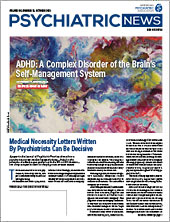The authoritative voice of a psychiatrist, backed by the law, can push insurance companies to do the right thing.
Joe Feldman of Wilmette, Ill., a suburb outside of Chicago, found that out when his teenage daughter experienced a mental health crisis during her high school years requiring residential treatment. When the insurance company denied continued treatment, he set out to prepare an appeal. “In doing so, I realized that what was missing was the voice of my daughter’s psychiatrist and another clinician involved in her care,” Feldman told Psychiatric News.
Working together, he and his daughter’s clinicians composed letters emphasizing the medical necessity of continued treatment. The insurance company pushed back.
After multiple denials, Feldman filed suit on behalf of his daughter, and in March 2019 a federal judge for the Northern District of Illinois ruled against the insurance company. The judge wrote that the company had failed to consider the clinician’s assessment that Feldman’s daughter was at “high risk” if forced into a lower level of care.
Feldman’s story came to the attention of Eric Plakun, M.D., medical director of the Austen Riggs Center and Area 1 APA Trustee. Plakun was an expert witness in
Wit v. United Behavioral Health in which he said he “got to see how the sausage is made in the world of access to care guidelines.” That landmark case found that the largest managed behavioral health care company had inappropriately denied thousands of claims for mental health care (
Psychiatric News).
Plakun also has a long view on the evolution of managed care from a movement to conserve finite medical resources for the greater good to a for-profit enterprise focused on cutting costs. “In the 90s after the failure of the Clinton health care reform effort, there were no rules on managed care,” he said. “It became the Wild West and managed care limited treatment to crisis stabilization.
“But now the Wild West is being tamed by the parity law and by litigation. Wit determined that insurance companies could not decide that treatment was only about crisis stabilization and nothing more.”
When Feldman contacted Plakun with his story about the effort to appeal the insurance company’s denial with a medical necessity letter from his daughter’s clinicians, Plakun knew that what was missing was language in the letter linking the clinicians’ assertions of medical necessity to the imperatives spelled out in the Wit decision. Especially important in that decision are the eight principles of effective evaluation and treatment of mental and substance use disorders that meet generally accepted standards. Those principles stipulate that effective care does the following:
•
Treats underlying problems and not just the current presenting problem.
•
Treats co-occurring conditions.
•
Uses a multidimensional assessment to determine level of care such as those developed by professional organizations.
•
Is individualized and without arbitrary limits on duration.
•
May be to maintain functional capacity or prevent deterioration.
•
Is both safe and effective.
•
Addresses special needs of children and adolescents when making level of care decisions.
•
Errs on the side of caution by using a higher level of care when there is ambiguity about the appropriate level of care
Now Feldman and Plakun—along with attorney Mark DeBofsky, J.D., and Cheryl Potts, M.B.A., executive director of The Kennedy Forum-Illinois—have published a paper in the Journal of Psychiatric Practice (edited by past APA President John Oldham, M.D., M.S.) about the power of a clinician-written medical necessity letter backed by the imperatives of the Wit decision and the eight principles of effective care.
The paper includes a description of the current managed care landscape, common reasons for denial of care, and the elements of an effective medical necessity letter. The paper also includes three appendices—a template for a medical necessity letter, suggested text for inclusion in a medical necessity letter derived from the Wit decision, and a patient handout that explains the value and importance of a medical necessity letter.
“Medical necessity letters are powerful tools in your clinical practice,” the authors wrote. “They do require some time and effort, but, having mastered the skill and designed a template for reuse, they are worth the effort. Individual patient letters may vary in length depending on complexity and circumstances, as well as the rationale for the recommended course of treatment. Keep in mind that a submission to an insurance entity generally requires consent of the patient, which should be noted early in the letter. Review of the letter with a patient is often a helpful step in strengthening the therapeutic alliance.”
Plakun said that the medical necessity letter can be decisive and a tool for psychiatrists to put the principles of the Wit decision to work for individual patients and to improve access to care for all.
“Whether we are talking about how to advance treatment for an individual or how to make a real difference in access to care and a reduction of health disparities, what we have to do is find ways to extend the impact of Wit beyond UBH to all commercial insurers and to Medicare and Medicaid.” he told Psychiatric News. “When those elements of effective treatment identified in Wit become accepted across the board and influence all insurance, that can really make a difference in reducing health disparities.”
UBH also settled two other lawsuits charging the company with violation of the federal parity law. One is a class action suit brought by the office of the New York State Attorney General (
Psychiatric News). And in August, the U.S. Department of Labor announced that UBH had agreed to pay $13.6 million to affected participants and beneficiaries and $2 million in penalties in settlement of the department’s lawsuit charging violation of the parity act; for further reporting, see an upcoming edition of
Psychiatric News.)
Today, Feldman’s daughter is pursuing an associate’s degree and doing well. He said that the medical necessity letter is a tool of empowerment—for psychiatrists and patients. “Clinicians don’t have to wish their patients ‘good luck’ when dealing with an insurance company denial but can change the expectation to one that, in fact, the insurance company will pay for necessary care,” he said.
“It’s a gift from a psychiatrist to the patient because it is information that patients can’t possibly be aware of on their own. They are already struggling, and insurance companies are opaque. This is a gift that says, ‘This treatment should be covered.’ ” ■
“Providing a Routine Medical Necessity Letter to Improve Access to Care for Our Patients” is posted
here.

